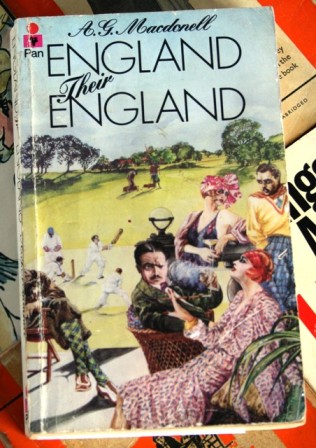
No 7: England their England by AG Macdonell
What’s it about?
Blown up in a trench on the Passchendaele Ridge in October 1917, the main protagonist Donald Cameron, a young man from the Mains of Balspindie in Aberdeenshire, takes some years before he is able, and forced by circumstance, to cope with anything more than working his family farm. His father’s will (as in “and testament”) drives him to London where the man he shared a pillbox with just before the fateful explosion offers him a commission to write a book. Cameron’s book’s raison d’etre is an examination of the nature of Englishness, as is Macdonnell’s which in a classic bildungsroman follows the young Scot through adventures and encounters at home and abroad. In a gentle unassuming way Cameron experiences public houses, an international conference, a country house weekend and the parade of unlikely characters who populate them.
What’s it got to do with leisure?
Mcdonnell’s “immortal” description of a village cricket match has been referenced, bastardised and mis-attributed by so many writers that its echoes will be familiar to anyone with an interest in cricket, society, village life or humorous descriptive writing. To read the original in its entirety is an unalloyed joy; from Donald’s arrival, on time and therefore alone, at his team’s Saturday morning rendezvous through the twists and turns of the match itself to the point when the shades of evening fall on the Three Horseshoes Inn with the game having ended in… well let’s not spoil it. Mcdonnell also takes time to describe golf as played in “one of the newest of the great golf clubs which are ringed round the north, west and south of London in such profusion”, to comment on professional football which appears venal, superficial and corrupt to Donald, and even “rugby union football” at a Varsity game where by half time “the green of the ground was a dark quagmire, the players were indistinguishable and... the gloom of winter twilight had so enveloped the ground that it was impossible to see more than twenty or thirty yards.” All of which meant that by the time 65,000 spectators had “formed themselves into a single mighty queue and set off at a slow shuffle through the mud and rain in the direction of the station” there were at least three schools of thought on the actual score.
Why should I read it?
In a time when Mr Richard Gervais is held to be a comic genius to rival Chaplin and the leader of Her Majesty’s Opposition is moved to giggle on national radio that “two twits make a twat” it is pleasant, if piquant, to look back at a time when the art of gentle satire was both possible and appreciated. Much has changed in Britain since the inter-war years but much remains the same and Mcdonnell’s eye for detail and his amused detachment allow the reader to wallow in the nostalgia and empathise with most of the protagonists while still recognising their feet of clay. Mcdonnell seems to love the English, Cameron certainly does, and if he also sees their foibles and their failings he sees them as part of a generally acceptable whole.
the leisure manager’s library
An occasional series offering a guide to leisure-related literature
